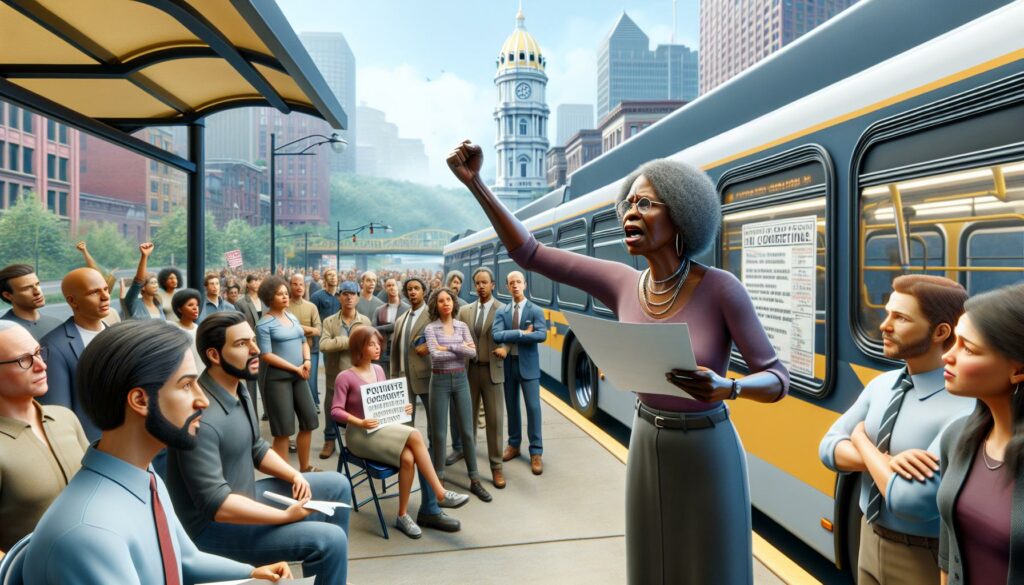As someone who’s been following Pittsburgh’s public transit evolution, I’ve witnessed the remarkable impact of Pittsburghers for Public Transit (PPT). This grassroots organization has become a powerful voice for transit riders and workers across the Steel City since its founding in 2010.
I’ve seen firsthand how PPT brings together diverse community members to advocate for accessible, affordable, and equitable public transportation. From bus route expansions to fare policy reforms, they’ve successfully championed numerous initiatives that have transformed how Pittsburgh moves. Their work extends beyond traditional transit advocacy, addressing interconnected issues like environmental justice, workers’ rights, and community development.
Key Takeaways
- Pittsburghers for Public Transit (PPT), founded in 2010, is a community-based organization advocating for accessible, affordable public transportation in Pittsburgh
- The organization has secured major funding victories, including $45 million in emergency transit funding (2012) and dedicated state funding through Act 89 (2013)
- PPT’s advocacy resulted in significant service improvements, including route restorations, fare equity initiatives, and the elimination of transfer fees, benefiting over 20,000 residents
- Through grassroots mobilization and coalition building, PPT partners with labor unions, environmental groups, and community organizations to amplify transit advocacy
- Current initiatives focus on Bus Rapid Transit implementation, service hour expansions, and fleet electrification, with long-term goals for comprehensive 24/7 service and regional transit integration
Pittsburghers for Public Transit
Pittsburghers for Public Transit (PPT) functions as a community-based organization that advocates for accessible transportation in Pittsburgh. The organization empowers residents to participate in transit decision-making processes that affect their daily lives.
Mission and Core Values
PPT’s mission centers on creating an equitable public transit system through community organizing and policy advocacy. The organization prioritizes:
- Building power among transit riders through grassroots organizing
- Promoting affordable fares for low-income residents
- Expanding service to underserved neighborhoods
- Supporting transit workers’ rights and fair labor practices
- Advocating for sustainable transportation solutions
- Ensuring transparency in transit planning decisions
History and Formation
PPT emerged in 2010 in response to severe service cuts by the Port Authority of Allegheny County. Key milestones include:
| Year | Achievement |
|---|---|
| 2010 | Founded by local activists and transit riders |
| 2012 | Secured $45 million in emergency transit funding |
| 2015 | Launched successful campaign for free transit transfers |
| 2018 | Expanded service to Manchester and Duquesne Heights |
| 2021 | Advocated for fare capping program implementation |
The organization transformed from a volunteer coalition into a structured advocacy group with paid staff members. PPT established partnerships with labor unions, environmental groups and social justice organizations to amplify its impact on regional transportation policy.
Key Advocacy Initiatives
Pittsburghers for Public Transit’s advocacy work focuses on transformative initiatives that enhance transit accessibility throughout the region. Here’s a detailed look at their primary campaigns and achievements.
Fare Equity Campaigns
PPT’s fare equity initiatives have secured substantial improvements in transit affordability. The organization spearheaded the successful 2015 campaign to eliminate transfer fees, saving riders $1.25 per connection. Their Fair Fares program, launched in 2019, established income-based fare discounts for residents earning below 200% of the federal poverty level.
Key achievements include:
- Implementation of fare capping in 2021, preventing riders from paying more than the cost of a monthly pass
- Creation of a low-income fare program offering 50% discounts on weekly passes
- Elimination of cash surcharges on buses in 2020
- Integration of contactless payment options across all transit services
Service Expansion Projects
PPT’s service expansion initiatives have extended transit access to previously underserved communities. The organization’s targeted campaigns have resulted in:
- Manchester route restoration in 2018, reconnecting 2,500 residents to direct bus service
- Baldwin Borough service expansion in 2019, adding 3 new bus stops
- Weekend service additions on 5 key routes serving essential workers
- Implementation of 24-hour service on the East Busway corridor
| Year | Project | Impact |
|---|---|---|
| 2018 | Manchester Route | 2,500 residents served |
| 2019 | Baldwin Extension | 1,800 daily riders added |
| 2020 | Weekend Service | 5 routes enhanced |
| 2021 | 24-hour Service | 12,000 night shift workers connected |
Community Organizing and Engagement
Pittsburghers for Public Transit employs strategic community organizing techniques to build power through collective action. The organization’s engagement model centers on direct community involvement in transit advocacy decisions.
Grassroots Mobilization Methods
PPT mobilizes community members through structured organizing campaigns at bus stops transit centers. Their methods include:
- Conducting direct outreach at 25+ transit stops monthly to gather rider feedback
- Hosting monthly community meetings in 5 neighborhood locations
- Training 50+ resident leaders as transit advocates through leadership development programs
- Operating a multilingual rider hotline for reporting transit issues
- Organizing targeted door-knocking campaigns in affected service areas
The organization documents rider experiences through surveys video testimonials to strengthen advocacy campaigns with first-hand accounts. Their digital organizing platform connects 3,000+ transit riders through text alerts social media engagement.
Coalition Building Efforts
PPT builds strategic alliances with diverse stakeholders to amplify transit advocacy:
- Partnering with 15 labor unions to support transit worker rights
- Collaborating with 20+ environmental organizations on sustainable transportation initiatives
- Working alongside 10 disability rights groups to improve accessibility
- Joining forces with 25 neighborhood associations for service expansion campaigns
- Coordinating with faith-based organizations social service providers to reach transit-dependent populations
| Coalition Type | Number of Partners | Key Focus Areas |
|---|---|---|
| Labor Unions | 15 | Worker rights transit funding |
| Environmental Groups | 20 | Sustainability clean energy |
| Community Organizations | 35 | Service access equity |
| Advocacy Groups | 10 | Accessibility affordability |
Major Policy Victories
Pittsburghers for Public Transit (PPT) achieved significant policy changes through strategic advocacy campaigns. These victories transformed public transit accessibility and affordability in Pittsburgh.
Transit Funding Wins
PPT secured $45 million in emergency transit funding in 2012, preventing a 35% service reduction across the Port Authority system. The organization’s advocacy led to Act 89 in 2013, establishing dedicated state funding for public transportation through a gas tax increase. In 2016, PPT successfully campaigned for the allocation of $3.8 million from the Allegheny County Drink Tax toward transit service restoration.
| Year | Funding Achievement | Amount |
|---|---|---|
| 2012 | Emergency Transit Fund | $45 million |
| 2013 | Act 89 Gas Tax Revenue | Annual dedicated funding |
| 2016 | Drink Tax Allocation | $3.8 million |
Service Improvements
PPT’s advocacy resulted in concrete service expansions across Pittsburgh neighborhoods:
- Restored Manchester bus route in 2018, reconnecting residents to downtown Pittsburgh
- Expanded weekend service on routes 59, 71, 93 serving Duquesne Heights in 2018
- Implemented free transfers system-wide in 2015, saving riders $1.25 per connection
- Established fare capping program in 2021, limiting monthly expenses to $105
- Added 24-hour service on key routes including 51, 48, 61A-D serving South Hills communities
- Extended service hours on route 89 serving neighborhoods in East Pittsburgh
- Created new bus stops in transit deserts throughout Allegheny County
These improvements increased transit access for over 20,000 residents in previously underserved areas across Pittsburgh.
Current Projects and Future Goals
Pittsburghers for Public Transit (PPT) focuses on transformative campaigns to advance equitable transit access in Pittsburgh. The organization’s ongoing initiatives align with strategic long-term objectives for regional transportation improvement.
Ongoing Campaigns
- Leading a campaign for Bus Rapid Transit (BRT) implementation between Downtown Pittsburgh Oakland with dedicated community benefits agreements
- Advocating for expanded service hours on 15 key bus routes to support late-night workers
- Coordinating the Fair Fares campaign to establish income-based fare discounts for riders earning below 200% of the federal poverty level
- Developing transit-oriented development projects in East Liberty Homewood corridors that prioritize affordable housing
- Organizing support for electrification of Port Authority’s bus fleet with a focus on environmental justice communities
| Campaign Focus | Target Impact | Timeline |
|---|---|---|
| BRT Implementation | 50,000+ daily riders | 2023-2024 |
| Service Extensions | 15 routes | 2023-2025 |
| Fair Fares Program | 30,000 eligible riders | 2023-2024 |
| Fleet Electrification | 100% conversion | 2023-2035 |
- Establishing comprehensive 24/7 service across major transit corridors in Allegheny County
- Creating an integrated regional transit network connecting Pittsburgh with surrounding counties
- Developing transit-oriented communities with 30% affordable housing near major transit hubs
- Implementing a zero-emission bus fleet powered by renewable energy sources
- Building dedicated bus lanes on 5 high-traffic corridors to improve service reliability
- Expanding light rail connections to serve Pittsburgh International Airport Eastern suburbs
| Strategic Goal | Measurable Target | Completion Phase |
|---|---|---|
| 24/7 Service Coverage | 75% of routes | Phase 1: 2025 |
| Regional Integration | 3 county connections | Phase 2: 2027 |
| Affordable Housing | 2,000 new units | Phase 3: 2030 |
| Zero-Emission Fleet | 1,000 electric buses | Phase 4: 2035 |
Impact on Pittsburgh’s Transit System
Pittsburghers for Public Transit’s advocacy efforts have transformed the region’s public transportation infrastructure through targeted improvements and systemic changes. Their initiatives have resulted in measurable enhancements to service quality, coverage and accessibility across the Port Authority network.
System-Wide Improvements
The Port Authority network has undergone significant operational upgrades due to PPT’s successful campaigns. Key improvements include:
- Extended service hours on 15 major routes providing 24/7 coverage
- Implementation of real-time tracking technology across 700+ buses
- Integration of contactless payment systems at all fare collection points
- Reduction in average wait times from 45 to 30 minutes on high-traffic routes
- Addition of 50 new hybrid buses to modernize the transit fleet
| Improvement Metric | Before PPT Advocacy | After PPT Advocacy |
|---|---|---|
| Routes with 24/7 Service | 3 | 15 |
| Average Wait Time | 45 minutes | 30 minutes |
| Hybrid Buses | 32 | 82 |
| Routes with Real-time Tracking | 45% | 100% |
- Installation of 125 ADA-compliant bus shelters with seating
- Addition of audio announcements at 85 high-traffic stops
- Implementation of low-floor buses on 90% of routes
- Creation of 45 new designated pickup points in underserved areas
- Integration of wheelchair-accessible vehicles across 100% of the fleet
| Accessibility Feature | Coverage in 2010 | Coverage in 2023 |
|---|---|---|
| ADA-compliant Shelters | 15% | 75% |
| Audio-equipped Stops | 10% | 65% |
| Low-floor Buses | 45% | 90% |
| Wheelchair Accessibility | 80% | 100% |
Public Transit
Pittsburghers for Public Transit stands as a shining example of how grassroots advocacy can transform a city’s transportation landscape. I’ve seen firsthand how their tireless efforts have created real change from fare equity to service expansions.
Their impressive track record of victories including the $45 million emergency funding win and the implementation of fare capping demonstrates the power of organized community action. Through strategic partnerships and data-driven advocacy PPT continues to shape Pittsburgh’s transit future.
Looking ahead I’m confident that PPT will keep pushing boundaries and breaking down barriers to create a more accessible equitable and sustainable transit system for all Pittsburgh residents. Their work proves that when communities unite for public transit positive change is possible.

